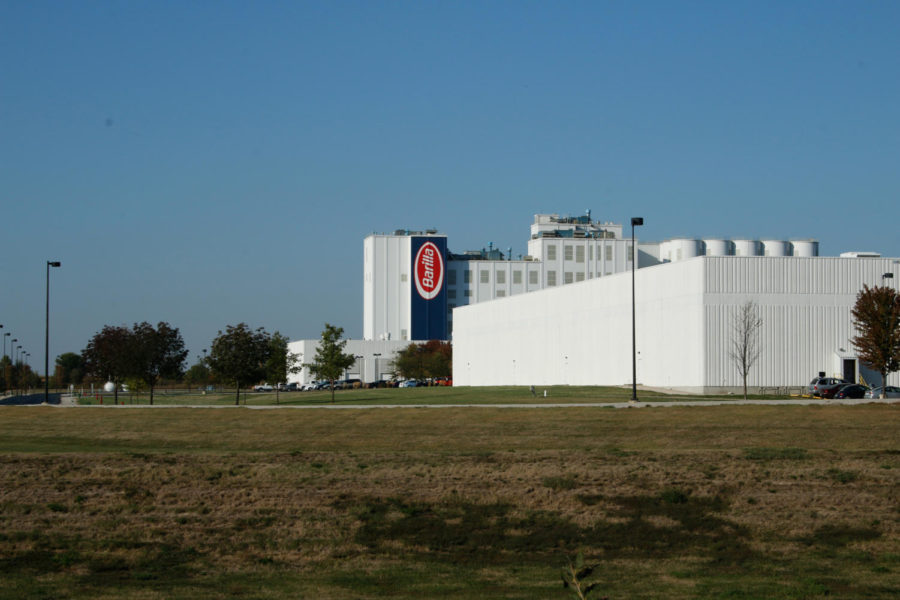Editorial: Barilla’s message bad for business
Hayley Hochstetler/Iowa State Daily
Guido Barilla, Barilla chairman made disparaging homophobic statements on Thursday. Ames is home to one of two Barilla production plants in the U.S.
September 26, 2013
Hate is everywhere, whether it is racism, homophobia or class warfare. However, it is particularly poignant when it is close to home, as is the case with Barilla Chairman Guido Barilla, who made prejudiced comments about the gay community on Thursday.
Barilla America Inc. is headquartered in Parma, Italy, but one of its two U.S. production plants is located here in Ames. The tall white cylinders of the plant, as well as the Barilla logo, greet many as they drive to Ames.
Chairman Barilla is reported as having said (translated from Italian): “We won’t include gays in our ads, because we like the traditional family. If gays don’t like it, they can always eat another brand of pasta.”
Barilla even saw fit to comment on gay affairs unrelated to his company, saying: “I have no respect for adoption by gay families because this concerns a person who is not able to choose.”
Ignoring the difficulty that gays might have in finding another pasta brand in Ames (other than generic store brands), the gay community and its supporters were understandably outraged by Barilla’s statements.
As in many U.S. states, gay marriage is not legal in Italy. Regardless, some of the population there is upset. In response, the president of Italy-based Equality Italia said: “We accept [Barilla’s] invitation to not eat his pasta.”
Barilla was quick to apologize for the offensive quotes, releasing a statement including the following: “I have the utmost respect for gay people and for everyone’s right to express themselves. I’ve also said — and I would like to reiterate — that I respect gay marriages.”
It would be a decent enough apology, except that this statement directly contradicts things Barilla previously said. No matter how carefully he proceeds from this point, Barilla can’t take back the things he already said. This renders all apologies useless and ironic.
In any case, this is not the first example of a company leader making anti-gay or otherwise offensive statements which directly lead to immediate consumer outrage.
The Abercrombie and Fitch CEO was met with national outrage when he was quoted as having said: “We want to market to cool, good-looking people; we don’t market to anyone other than that,” as well as numerous other exclusionary remarks.
The company, who doesn’t see fit to sell women’s clothes above a size 10 but sells men’s clothing up to an XXL, was boycotted by many groups in response to the CEO’s offensive stance.
When the president of Chick-fil-A made several anti-gay statements, the gay community and gay rights activists were furious. The word “boycott” streamed across Twitter, Facebook and all other forms of social media, just as it is with the Barilla comments. Despite this, the company profited from the “bad” publicity as a result of a large positive response from religious communities.
Regardless of whether these particular companies profited from their offensive statements, it seems a questionable business model to exclude groups within a consumer population. And, based on the apologetic statements that most of these company leaders issue after the fact, they know it, too.
Consumers have made it known they do care about the policies and ideals of the company they are choosing to give their loyalty and money to. Owners certainly have a right to their own opinions, but attaching those opinions with their company is foolish when the goal is to please the consumer and make a profit.
A local boycott of Barilla will only harm the workers of the Ames and Nevada community, who are distantly associated with their Italian headquarters. Additionally, Chick-fil-A is a good example of how some boycotts might not override oppositional support.
Either way, sensational statements made by business owners may grab the headlines, but they most likely aren’t going to be bringing in any new business. As a nation of consumers, we have the ability to send clear messages by the products we choose to place in our home cabinets and refrigerators. Business owners, on the other hand, might want to rethink before attaching a personal view to their company.







